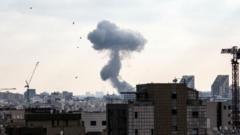Nationwide protests against the Trump administration's recent airstrikes on Iran unfolded this weekend, echoing concern over escalating conflict and attributing blame to leadership in both Tehran and Washington.
Small Protests Erupt Across the U.S. Following Iran Airstrikes

Small Protests Erupt Across the U.S. Following Iran Airstrikes
Public sentiment against U.S. military involvement in Iran draws hundreds to city streets.
In more than a dozen cities including New York, Washington, and Los Angeles, demonstrators gathered on Sunday, responding to the Trump administration’s airstrikes on Iran that occurred earlier this month. While the turnout saw hundreds in major cities, it was notably smaller than last weekend's widespread “No Kings” protests, which spanned all 50 states. Organizers described these late Saturday mobilizations as urgent responses, indicating a growing unease among the public about renewed military actions overseas.
In Washington D.C., a gathering of around 200 people, including several veterans, voiced their opposition outside the White House. Ron Carmichael, a Korean War veteran, voiced concern over what he perceives as the president's authoritarian approach: “He’s trying to become a king.” Likewise, a rally in Chicago attracted over 200 attendees, with immigrants like Ali Tarokh, who fled Iran after political imprisonment, sharing their dismay over the airstrikes. He described the military action as “the worst thing that could have happened,” arguing for a gradual reform in Iran rather than forceful regime change.
In Los Angeles, Noor Abdel-Haq expressed her personal concerns, highlighting the detrimental impact these conflicts have on her family residing in Gaza. “We don’t want more murder and destruction,” she stated, as a peaceful demonstration unfolded nearby, overseen by tactical federal agents.
In Virginia, Violeta Vega led a modest rally in Richmond, where chants echoed demands for more funding for social issues and less for military endeavors. “I felt empowered knowing that this was a day of action around the country,” she reflected, emphasizing the need for collective voices against war.
This weekend's protests underscored the complexities of public opinion surrounding U.S. interventions in foreign conflicts, revealing a citizenry divided in their views toward both domestic leadership and international affairs.
In Washington D.C., a gathering of around 200 people, including several veterans, voiced their opposition outside the White House. Ron Carmichael, a Korean War veteran, voiced concern over what he perceives as the president's authoritarian approach: “He’s trying to become a king.” Likewise, a rally in Chicago attracted over 200 attendees, with immigrants like Ali Tarokh, who fled Iran after political imprisonment, sharing their dismay over the airstrikes. He described the military action as “the worst thing that could have happened,” arguing for a gradual reform in Iran rather than forceful regime change.
In Los Angeles, Noor Abdel-Haq expressed her personal concerns, highlighting the detrimental impact these conflicts have on her family residing in Gaza. “We don’t want more murder and destruction,” she stated, as a peaceful demonstration unfolded nearby, overseen by tactical federal agents.
In Virginia, Violeta Vega led a modest rally in Richmond, where chants echoed demands for more funding for social issues and less for military endeavors. “I felt empowered knowing that this was a day of action around the country,” she reflected, emphasizing the need for collective voices against war.
This weekend's protests underscored the complexities of public opinion surrounding U.S. interventions in foreign conflicts, revealing a citizenry divided in their views toward both domestic leadership and international affairs.





















